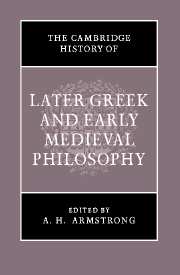Book contents
- Frontmatter
- Chapter 1 Introductory
- Part 1 GREEK PHILOSOPHY FROM PLATO TO PLOTINUS
- Part II PHILO AND THE BEGINNINGS OF CHRISTIAN THOUGHT
- Part III PLOTINUS
- Chapter 12 Life: Plotinus and the religion and superstition of his time
- Chapter 13 Teaching and writing
- Chapter 14 Man and reality
- Chapter 15 The One and Intellect
- Chapter 16 From Intellect to matter: the return to the One
- Part IV THE LATER NEOPLATONISTS
- Part V MARIUS VICTORINUS AND AUGUSTINE
- Part VI THE GREEK CHRISTIAN PLATONIST TRADITION FROM THE CAPPADOCIANS TO MAXIMUS AND ERIUGENA
- Part VII WESTERN CHRISTIAN THOUGHT FROM BOETHIUS TO ANSELM
- Part VIII EARLY ISLAMIC PHILOSOPHY
- Select Bibliography
- Additional Notes and Bibliography
- Index of ancient and medieval works referred to in the text
- General Index
- Index of Greek terms
- References
Chapter 13 - Teaching and writing
from Part III - PLOTINUS
Published online by Cambridge University Press: 28 March 2008
- Frontmatter
- Chapter 1 Introductory
- Part 1 GREEK PHILOSOPHY FROM PLATO TO PLOTINUS
- Part II PHILO AND THE BEGINNINGS OF CHRISTIAN THOUGHT
- Part III PLOTINUS
- Chapter 12 Life: Plotinus and the religion and superstition of his time
- Chapter 13 Teaching and writing
- Chapter 14 Man and reality
- Chapter 15 The One and Intellect
- Chapter 16 From Intellect to matter: the return to the One
- Part IV THE LATER NEOPLATONISTS
- Part V MARIUS VICTORINUS AND AUGUSTINE
- Part VI THE GREEK CHRISTIAN PLATONIST TRADITION FROM THE CAPPADOCIANS TO MAXIMUS AND ERIUGENA
- Part VII WESTERN CHRISTIAN THOUGHT FROM BOETHIUS TO ANSELM
- Part VIII EARLY ISLAMIC PHILOSOPHY
- Select Bibliography
- Additional Notes and Bibliography
- Index of ancient and medieval works referred to in the text
- General Index
- Index of Greek terms
- References
Summary
The part of Porphyry's description of Plotinus at Rome which is most interesting to a historian of philosophy is of course his account of his master's method of teaching and writing, of his knowledge and use of previous philosophers and his relations with the philosophers of his own time. About all this Porphyry tells us a good deal which is helpful to our understanding of the Enneads. The lectures of Plotinus were not the formal, carefully arranged, set speeches developing a theme along lines fixed by established tradition which were customary in the philosophical schools of his time. The procedure in his school was informal, some said disorderly. Plotinus was a systematic and dogmatic philosopher, who had no doubt that he knew the right answers to the great philosophical questions which he treated: but he was not the sort of systematizer and dogmatist who cannot tolerate queries, objections and interruptions. He had a Socratic belief in the value of discussion, and once a discussion had started in his school it had to go on to the end, till the difficulties raised had been properly solved, however long it took. A story which Porphyry tells gives an excellent idea of the spirit in which Plotinus met queries and objections. A man called Thaumasius came into the school one day when Plotinus was arguing with Porphyry about the relationship between soul and body (the argument lasted three days) and demanded a set lecture suitable for writing down; he could not, he said, stand Porphyry's questions and answers. But Plotinus said ‘If we do not solve the difficulties which Porphyry raises in his questions we shall be able to say absolutely nothing suitable for writing down’.
- Type
- Chapter
- Information
- Publisher: Cambridge University PressPrint publication year: 1967
References
- 1
- Cited by



